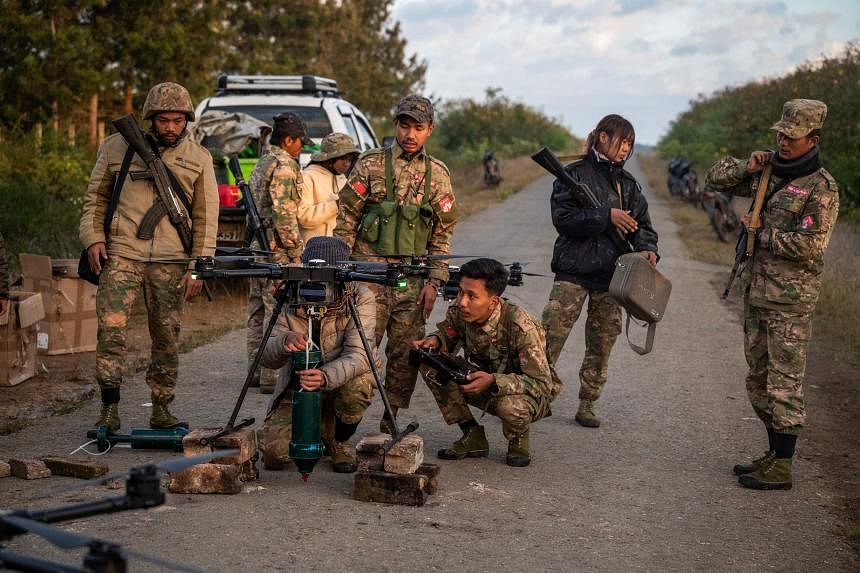BANGKOK/ NEW DELHI - For the first time since Myanmar’s 2021 military coup, the junta has sent a senior official to take part in an Asean foreign ministers’ meeting. Instead of sitting out the Asean Foreign Ministers’ Retreat on Jan 29 because the bloc had barred it from sending a political appointee, the junta dispatched the permanent secretary of the foreign ministry under its control.
Few expect the junta’s climbdown on Jan 29 to expand any time soon to dialogue that will end the spiralling humanitarian crisis. But the balance of power in Myanmar is slowly shifting, leaving Myanmar’s neighbours grappling with good ways to hedge their bets against an embattled junta.
For now, no country looks better placed than China. “Operation 1027”, launched by the Three Brotherhood Alliance of ethnic armed groups in October 2023, toppled junta control in at least 17 towns in northern Shan state near the Chinese border and resulted in the mass surrender of over 2,000 junta soldiers as well as six brigadier-generals. Notably, the alliance made a show of clearing out the online scam operations that Beijing had been appealing to the junta to root out – but to no avail.
Beijing flexed its influence by brokering a ceasefire on Jan 12 that essentially cemented these new territorial positions. Under the “Haigeng Agreement” inked in the Chinese city of Kunming, both sides agreed not to attack each other’s positions, as well as to avoid harming Chinese nationals or destroying Chinese investments in Myanmar.
“The new status quo was consolidated in writing, in the ceasefire agreement in Kunming,” Ms Yun Sun, director of the China Programme at Stimson Centre, a United States-based think-tank, told The Straits Times. “That means the Chinese are pleased with the status quo.”
It remains to be seen if this ceasefire will hold, as other armed groups not party to the agreement have tried to capitalise on the momentum to topple the junta elsewhere in the country.
But China is continuing work along the China-Myanmar Economic Corridor, including surveys for the future railway that will link Yunnan to the Chinese-backed port project in Myanmar’s Kyaukphyu, along the coast of the Bay of Bengal that opens to the Indian Ocean.
Ms Sun thinks that all parties will try to avoid damaging Chinese interests even if fighting intensifies.
“I don’t think we should underestimate how much influence China has in that region or in that area. Any group that targets the Chinese projects will face mounting pressure and tremendous pressure in its future survival,” she said.
Over in India, the fallout from Operation 1027 has prompted a rethink among the establishment, with many arguing that the Myanmar junta is in no position to defend India’s interests and calling for New Delhi to instead support resistance forces more actively.
“Because the junta is not in a position to ensure political stability, it is also not going to be able to provide the social and economic fertile ground needed for foreign investment and projects to go ahead in Myanmar,” said Mr Angshuman Choudhury, an associate fellow with the Centre for Policy Research, a New Delhi-based think-tank.
“In that sense, the junta is a volatile partner, which is not good news for any country wanting to invest in Myanmar.”
India’s interests in Myanmar include its geostrategic investments, such as the India-Myanmar-Thailand Trilateral Highway and the Kaladan Multimodal Transit Transport Project connecting the eastern Indian seaport of Kolkata with Sittwe seaport in Myanmar’s Rakhine state – key components of the government’s wider strategic outreach to South-east Asia.
Other key interests are India’s desire to limit China’s influence in the region and ensure militant groups that target India in the north-east do not use Myanmar as a sanctuary. According to Mr Choudhury, these goals have floundered since the coup as key territories with Indian interests and investment – such as Khampat on the India-Myanmar-Thailand Trilateral Highway – fell under rebel control, and China steals a march over India with its more proactive engagement with resistance forces.
Thousands of Myanmar people have also sought refuge in India, and New Delhi has accused Myanmar-based groups of crossing the porous border to mount attacks in its territory and smuggling contraband goods. This has prompted New Delhi to recently announce that it would fence the Indian-Myanmar border and potentially end an arrangement that allows liberal cross-border movement of locals in that vicinity.
While it will not be easy for New Delhi to move away from its almost singular reliance on the junta, with which it has developed strategic links, Mr Choudhury says it should ramp up engagement with Myanmar’s shadow National Unity Government (NUG) “at the highest level”, which would also enable it to reach out to armed resistance groups under the NUG’s control.
The role of Thailand, another of Myanmar’s neighbours, is similarly ripe for a rethink. Thailand has received many appeals to create a humanitarian corridor since the coup. The new government under the Pheu Thai Party has recently pledged to establish a centre for humanitarian aid by the border – though it seems to have engaged only with the junta or junta-controlled agencies. The NUG says it has not been contacted about these plans.
Thailand has in the past been accused of neutralising Asean’s efforts by holding its own ministerial meetings with the Myanmar junta. Critics had attributed this to the strong military ties between the two countries.
The new Thai government is expected to tread carefully on this, if only because there appears to be a dearth of fresh ideas on how to move ahead, said Dr Surachanee Sriyai, a visiting fellow at the ISEAS – Yusof Ishak Institute.
She told ST: “There won’t be a drastic upside-down development in terms of Thailand’s approach to Myanmar with the Pheu Thai Party administration.
“The status quo will remain for the most part, but Thailand now understands that deviating from Asean principles is damaging to its international reputation. So, no secret ministerial meetings – yet.”

